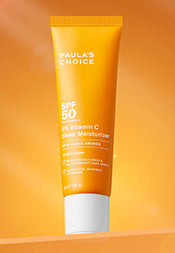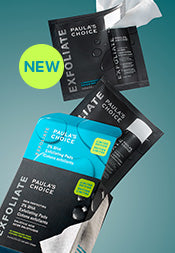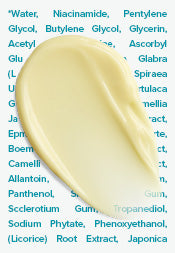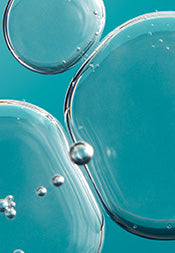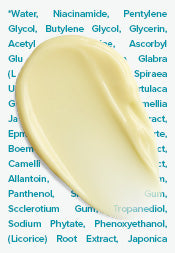What You Need to Know About Natural Skincare
Natural ingredients can do amazing things for your skin but knowing which ones to use makes all the difference in the world. Depending on the natural ingredient and its form, it can supply skin-saving or environmental stress-defending antioxidants. Essentially, good skin replenishing ingredients can hydrate, soothe, smooth, and brighten, they can even de-wrinkle as well as visibly firm skin. These ingredients all have different parts to play in skincare, some are better at one thing than another, just as different foods offer different health benefits.
However, just as excessive consumption of something is not good for you (too much sugar or alcohol is bad), not all natural skincare ingredients are good for you, either. What you choose to put on your skin really does matter. We only want you to use the skincare ingredients that deliver great results without any negative impact on your skin, and we know that’s what you want as well. The following are some beauty related truths covering what you must know before buying skincare products with natural ingredients.
The Best Types of Natural Ingredients for Skincare
Just as there are good and bad synthetic ingredients, there are also good and bad natural ingredients. Finding out which are the good ones for skincare — those with research backing their benefits — means knowing these facts:
- Non-fragrant plant oils are a beautifully rich source of essential fatty acids, micronutrients, and antioxidants for all skin types (especially for dry skin).
- Natural vitamins, including ascorbic acid (vitamin C), niacinamide (vitamin B3), and tocopherol (vitamin E) are powerful antioxidants with benefits that boost the skin’s environmental defences.
- Amino acids, most types of algae, aloe vera, and dozens of other non-fragrant plant extracts, ranging from green tea to grape extract, can hydrate, protect against moisture loss, soften discolourations, and help shield skin from the visible effects of pollution.
- Food ingredients, from fruits to grains to omega fatty acids and vegetables, are also great for hydrating and defending skin, not to mention the additional soothing and replenishing benefits from omega acids.
Essentially, the best natural ingredients for skincare are the ones that don’t produce any fragrance. Whether natural or synthetic, fragrances are problematic to skin.
Nature Natural vs. Skin Natural
Some of the most effective anti-ageing ingredients (like hyaluronic acid, retinol, and ceramides) are naturally present in healthy skin, but they aren’t found in many other places in nature. We refer to these as “skin natural.” These ingredients work quickly to diminish signs of wrinkles, uneven skin tone, and dullness, as well as restore a more resilient feel to skin that has lost its bounce.
How do they do this? By interacting with, improving, and replenishing the same naturally occurring substances in the skin’s uppermost layers to restore how it looks and feels, and to interrupt external aggressors just like younger skin does. Most often, these ingredients are synthetically derived, so you can enjoy the benefits from these great ingredients without feeling guilty.
The Important, Vital Role of Synthetic Skincare Ingredients
To be most effective as well as stable during use (trust us, you want stable natural ingredients — think how long salad greens last in your refrigerator), natural ingredients need friends. These friends are synthetic ingredients that are more stable and are more bioavailable than their natural counterparts. The synthetic ingredients aren’t scary; in fact, most of these synthetic ingredients when used along with natural ingredients are not only perfectly safe for skin, they are also the best way to balance and take care of your skin.
The right synthetic ingredients make natural ingredients even more effective by:
- Keeping products blended (so the oil and water parts don’t separate).
- Creating product textures that feel fantastic (which would be impossible if you are only using natural ingredients).
- Including advanced delivery systems that help natural ingredients reach their target areas of skin or, as with retinol, offer controlled release for gentleness without losing any anti-ageing power.
- Allowing for better delivery of ingredients, such as leave-on exfoliants and potent antioxidants; for example, the relationship between green tea extract and its lab-derived potent form, epigallocatechin gallate.
- Because our skin can’t fully utilise an extract’s benefits, as it usually needs only one aspect of it (primarily the antioxidant component), the synthetic version is thus a better option for skin.
The synergy between natural and synthetic ingredients gives your skin the best of what nature and science offer
Consider this: Lots of skincare concerns require synthetic ingredients to work. For example, no natural ingredients have proven to be as effective on acne as salicylic acid and benzoyl peroxide. Lab-engineered synthetic peptides can precisely target key skin concerns to steadily improve them, so you’ll see fewer wrinkles and skin tone issues.
Is Natural Sun Protection Possible?
Contrary to what you might have read, there’s no such thing as an all-natural sunscreen. This especially includes coconut oil, as there’s no research proving it works in any way like a real sunscreen labelled with an SPF rating — not even close!
Even natural mineral-based sunscreen ingredients such as titanium dioxide and zinc oxide are almost always altered, to the point that they no longer resemble their natural state. That’s good, because in their altered state these ingredients are far better for skin and much more pleasant to use. They’re also safer, because naturally occurring undesirable elements (like lead) are removed from the equation.
Natural Skincare Claims
The labels for most natural skincare products list several claims about the level of it being natural and, in some cases, their organic content or certification. The number of overlapping claims is confusing, but the fundamental problem is the lack of global agreement on what all these various claims mean or should mean.
Even more confusing, we see lots of product lines claiming to be “all natural,” yet they contain synthetic ingredients. We don’t think that’s bad; rather, it’s disingenuous and misleading to the consumer.
The basic fact is few skincare products really qualify as “all natural”. For example, any water-based product requires preservatives to keep it safe from contaminants that could cause problems for your skin. Some brands use natural preservatives (like grapefruit seed extract), but to date, no natural preservatives have proven to be as effective as synthetic preservatives, one of which being phenoxyethanol.
How Paula’s Choice Skincare Defines Natural
Paula’s Choice Skincare includes natural ingredients in most of our products, based on the essential aspects of what makes a great natural ingredient. In addition, every natural ingredient we use must have research proving its value for your skin. We never include natural ingredients just for show or marketing; each one must improve your skin and be compatible with the other ingredients in each product.
Our approach to natural ingredients enables us to create a full line of exceptionally effective, safe skincare products that offer solutions for all skin types and concerns, from acne to wrinkles. Nature has a lot to offer your skin, but we’re equally impressed by science!
Shop our Earth Sourced range of skincare products made up of natural ingredients here.
References for this information
Anais Brasileiros de Dermotologia, May-June 2017, pages 356–362
Environmental Science Europe, March 2016, ePublication
Journal of Drugs in Dermatology, September 2014, pages 1019–1026
Iranian Journal of Basic Medical Sciences, July-August 2014, issue 4, pages 295–307
Evidence-Based Complementary and Alternative Medicine, January 2013, ePublication


